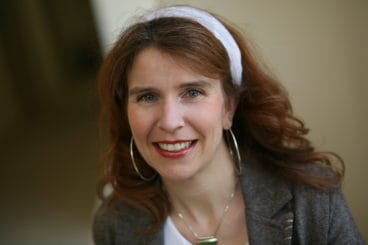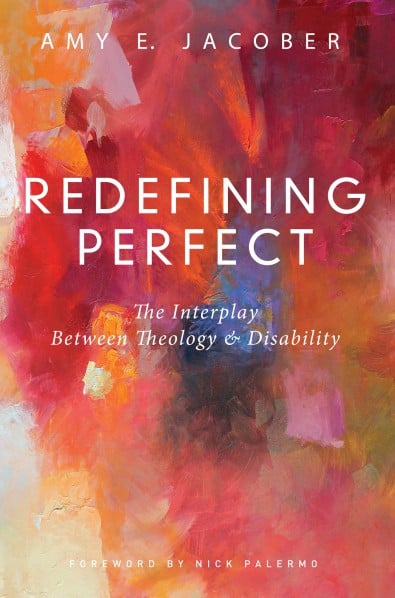
Amy Jacober remembers well the anger she felt when, in her early 20s, she saw a first-grade girl get kicked out of her church’s youth choir. The girl, a daughter of close friends, had Down syndrome, and the choir’s director decided since there was no one to help the child navigate her time in choir, she would be banned from participating.
“So I joined the first-grade choir,” Jacober said in a recent interview. Upset that in a congregation of 10,000 people, not one member could be found to facilitate the girl’s success in choir, Jacober signed up. Her decision made it possible for the first-grader to continue doing something she loved, but also compelled Jacober to begin asking more questions about disability and the church, questions she answers compellingly in her excellent new book, Redefining Perfect: The Interplay Between Theology and Disability.
At the center of Jacober’s theology—a theology that is both theoretical and practical—is the idea that we need to move beyond simply welcoming those with disabilities into our church communities; instead, we need to embrace a more expansive, and more biblical, understanding of disability that is fully inclusive and fully reciprocal.
…we need to move beyond simply welcoming those with disabilities into our church communities.
According to Jacober, one way Christian communities can become more fully inclusive is by acknowledging difference, rather than pathologizing those who are different and assuming those with physical, intellectual, or emotional disability have little to offer the communities in which they live. Instead, being an inclusive church means recognizing—and using—the gifts every person has, including those with disabilities.
Jacober describes writing her book as a 15- to 20-year process, which has included working with those who have disabilities, serving as a mentor to teens with disabilities through youth groups and summer camps, and caregiving for a family member who has a disability. But her theology was also forged through formal education, including a Master’s of Social Work degree, as well as a Ph.D. in theology. She currently serves as a founding member and faculty for the Sonoran Theological Group.

Redefining Perfect reflects Jacober’s training as a theologian as well as her practice in youth ministry—and, she says, rather than write a “400-page theological tome” about disability, she hopes her book will be accessible for those who haven’t thought much about the relationship between disability and theology: which means, unfortunately, just about everyone.
“The theology that most non-theological people learn is in their formative years,” Jacober says, and those beliefs about God and the Bible and what it means to be a person of faith stay with people into adulthood. Because she often works with teens, Jacober is committed to being “on point” with a theology that will carry them into adulthood; for too many Christian young people, the simplistic theology of their upbringing proves incapable of informing the real-life challenges that come with being an adult, challenges that often test our faith.
Developing an early understanding about the relationship between disability and theology matters, she says, because of this: the perspective one learns in childhood about disability will shape how one relates to those with disabilities as an adult, whether that person with disability is a child, a parent, or someone in the community.
Jacober’s book, both accessible and profound, plots out what a theology of disability could look like. In chapters ranging from explorations of sovereignty to theodicy, the matter of sin to suffering and hope, Jacober deconstructs the Christian church’s prevailing attitudes about disability—attitudes that often result in exclusion, infantilization, villainizing, victimizing, and marginalizing those with disabilities.
Concurrently, Jacober reconstructs a far more hopeful and healing vision of the church, one that goes beyond making space for those with disabilities by merely providing accessible parking or seating or other accommodations. Instead, Jacober contends that Scripture invites us to honor the gifts those with disabilities can bring to communities in reciprocal, right relationships—gifts that can be used in worship, in discipleship, and in vocational calling.
“To live in service with others demands that we value one another completely,” Jacober writes in Redefining Perfect. “Ephesians 1 lays out a picture of what it looks like to serve in unity with the connect of vocational call…It behooves us as followers of Christ not only to serve out of the integrity of our own discipleship, but to create ways and encourage others to do the same.”
In finding vocation, in worshipping God, in communicating and relating to others: in all these ways, those with disabilities might operate differently than what we expect or privilege. Jacober convincingly argues that we need to embrace, rather than mute, these differences, because they reflect the amazing diversity of God and of what it means to be created in God’s image.
This includes the paradigms we’ve created for what church leadership looks like. Real change will not happen within churches until those with disabilities are “absolutely” reflected in leadership, Jacober said. And this will not happen until people redefine how we traditionally view Christian leaders, theologians, and teachers.
Real change will not happen within churches until those with disabilities are absolutely reflected in leadership. And this will not happen until people redefine how we traditionally view Christian leaders, theologians, and teachers.
Jacober shared the example of someone with cerebral palsy who might find writing a physical challenge, but who has important ideas to share with the world about disability and about other topics, too. Rather than assuming that our best Christian thinkers will always turn to the written word to explore important theology—thus making it difficult for someone with physical disabilities to share her knowledge with the world—we need to legitimatize other methods of sharing knowledge. This might include creating platforms for those with disabilities to speak; this definitely includes patiently making room for others to listen.
Doing work on theology through the lens of disability has made Jacober a much better theologian overall, she says, because she is able to write about other kinds of inequity—be it racial, ethnic, gender—given the understanding she’s found through thinking about and then writing Redefining Perfect. In her next project, Jacober hopes to have people with disabilities tell their stories about how the doctrinal concepts she considers in Redefining Perfect have been made operational in their lived experiences.
Jacober is endeavoring to create a curriculum about people with disabilities, equipping teens to be in healthy, holy relationships with those around them, whether they have disabilities or not. She would also like to write about the idea of Sabbath, not as merely time off from work, but also as a biblical concept with deep connections to social justice.
A consideration of Sabbath and time is important in Jacober’s work on disability as well. She has been inspired by John Swinton, a seminary professor at the University of Aberdeen, who argues that too many of us are rushed in our lives, and we miss seeing God. “People with disabilities often demand we slow down if we are willing to,” Jacober said in referencing Swinton’s work. “They invite us to a slower pace of life.”
Fundamentally, Jacober—through her advocacy and through her theological work—challenges Christians to consider how they contribute to the dehumanization of those with disabilities. She calls us to “redefine perfect” by acknowledging that “something that is different isn’t something that needs to be fixed,” she says.
Something that is different isn’t something that needs to be fixed.
“There is a difference between being healed and being cured,” Jacober says. Too often, Christians look with pity on those with disabilities, assuming that curing them of their disability is exactly what God—and they themselves—want. Even the impulse of pity and the longing to “pray for healing” is problematic. Instead, Jacober wants people to see that those with disabilities need space to be exactly who God created them to be, just as they are, and that they also have good gifts to provide their communities.
“God created everyone in God’s image,” Jacober says. “Everyone has something to bring to the table.” Recognizing this requires that we redefine how that table might be set, and who should receive an invitation.
Melanie Springer Mock is a Professor of English at George Fox University, Newberg, Oregon. She is also the author or co-author of five books including, most recently, Worthy: Finding Yourself in a World Expecting Someone Else (Herald Press, 2018). Her essays and reviews have appeared in The Nation, Christianity Today, The Chronicle of Higher Education, and Mennonite World Review, among other places.


